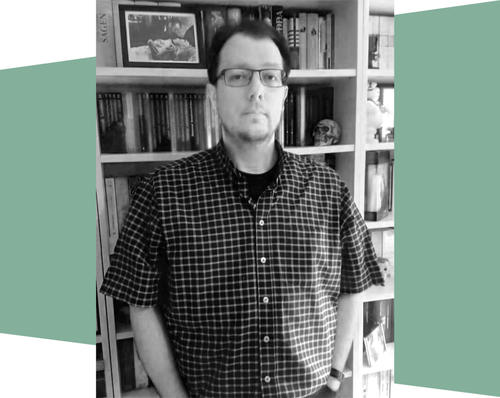Tobias Haupts
Tobias Haupts war als wissenschaftlicher Mitarbeiter am Seminar für Filmwissenschaft der Freien Universität Berlin und als Lehrbeauftragter im Bereich Filmgeschichte am Institut für Theater-, Film- und Fernsehwissenschaft der Universität zu Köln tätig. Seine Forschungsschwerpunkte liegen in der Medien- und Filmgeschichte (insbesondere Deutschlands), der Genreästhetik und -geschichte, Film und Theologie, sowie der Medienkulturwissenschaft der 1980er- und 1990er-Jahre.
Er ist unter anderem Mitherausgeber des 2021 publizierten Sammelbands "Space Agency – Medien und Poetiken des Weltraums" (mit Christian Pischel) und war bis 2020 Vorstandsmitglied der Gesellschaft für Fantastikforschung. Haupts' aktuelles Forschungsprojekt, das auf seiner 2014 erschienenen Dissertation zur Geschichte und medialen Praxis von Videotheken aufbaut, befasst sich mit der Geschichte des bundesdeutschen Films der 1980er-Jahre. Unter dem methodischen Aspekt der historischen Poetik werden die Produktions- und Distributionsmechanismen des Jahrzehnts als spezifisches Medienensemble untersucht.
Three Quick Questions:
In a few words, can you tell us about your current research interest?
At the moment I am working on an essay about the US fantasy films of the years 1977 to 1987. During my time at Cinepoectics I will work on a monograph about the films of the 1980s in the Federal Republic of Germany. A subject that has occupied me for a long time and is now finally to become writing.
How do you relate the term poiesis to your work?
I am highly convinced of the concept of the historical poetics of film as outlined by Hermann Kappelhoff and Matthias Grotkopp, based on their work in the context of Cinepoetics. I will try to make this approach fruitful for my own work.
Which film or other audiovisual format has resonated with you lately and why?
Two of the films I saw in theaters in recent weeks, the German trash comedy SKY SHARKS and the new James Bond film NO TIME TO DIE, reminded me vividly of the research work of my dear colleague Eileen Rositzka. Beside everything I miss her work and impulses immensely.
